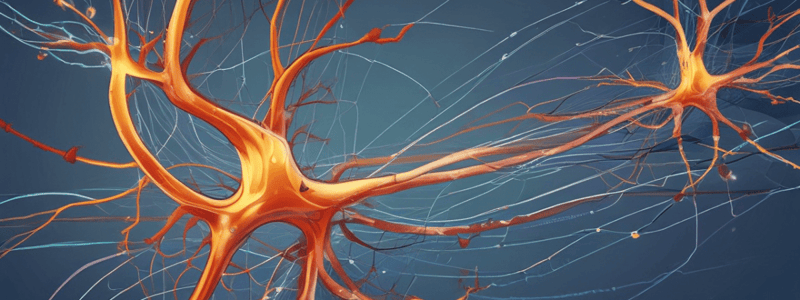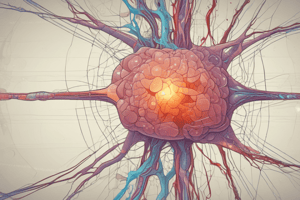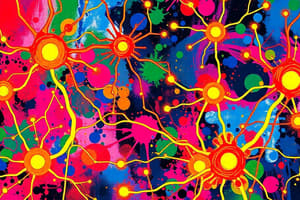Podcast
Questions and Answers
What is the primary effect of opening sodium (Na+) channels in a cell?
What is the primary effect of opening sodium (Na+) channels in a cell?
- Hyperpolarization
- No change in membrane potential
- Depolarization (correct)
- Repolarization
Which force primarily causes the efflux of potassium (K+) out of the cell when potassium channels open?
Which force primarily causes the efflux of potassium (K+) out of the cell when potassium channels open?
- Attraction due to opposing charges
- Concentration gradient leading to diffusion (correct)
- Electrical gradient favoring potassium entry
- Mechanical pressure aiding ion movement
What is the resting membrane potential typically assumed to be in most cells?
What is the resting membrane potential typically assumed to be in most cells?
- -70 mV (correct)
- -90 mV
- -40 mV
- -60 mV
What key factor contributes to establishing the resting membrane potential?
What key factor contributes to establishing the resting membrane potential?
In which scenario would potassium (K+) ions be more likely to flow into the cell?
In which scenario would potassium (K+) ions be more likely to flow into the cell?
What two forces influence the movement of ions across the cell membrane?
What two forces influence the movement of ions across the cell membrane?
How does the Nernst equation apply to the membrane potential of cells?
How does the Nernst equation apply to the membrane potential of cells?
Which ion typically has the largest influence on the resting membrane potential due to its permeability?
Which ion typically has the largest influence on the resting membrane potential due to its permeability?
Which ion is predominantly higher in concentration outside of a typical excitable cell at rest?
Which ion is predominantly higher in concentration outside of a typical excitable cell at rest?
What is primarily responsible for establishing the membrane potential in excitable cells?
What is primarily responsible for establishing the membrane potential in excitable cells?
During an action potential, what occurs first?
During an action potential, what occurs first?
Which term describes the period during which a neuron cannot fire another action potential?
Which term describes the period during which a neuron cannot fire another action potential?
What is primarily measured in an intracellular recording?
What is primarily measured in an intracellular recording?
What role does myelin play in the conduction of action potentials?
What role does myelin play in the conduction of action potentials?
What is the primary function of the sodium-potassium pump in excitable cells?
What is the primary function of the sodium-potassium pump in excitable cells?
Which of the following most accurately describes an action potential?
Which of the following most accurately describes an action potential?
What causes the resting membrane potential to be around -70 mV?
What causes the resting membrane potential to be around -70 mV?
Which ion is actively pumped into the cell by the Na+/K+-ATPase pump?
Which ion is actively pumped into the cell by the Na+/K+-ATPase pump?
What effect does depolarization of the membrane have on ion movement?
What effect does depolarization of the membrane have on ion movement?
Which type of recording involves placing an electrode outside the cell?
Which type of recording involves placing an electrode outside the cell?
How many sodium (Na+) ions are actively transported out of the cell by the Na+/K+-ATPase pump?
How many sodium (Na+) ions are actively transported out of the cell by the Na+/K+-ATPase pump?
What is the role of ion channels in the membrane?
What is the role of ion channels in the membrane?
What happens to K+ ions when the inside of the cell is very negative?
What happens to K+ ions when the inside of the cell is very negative?
What is the primary method through which the resting membrane potential is maintained?
What is the primary method through which the resting membrane potential is maintained?
What is the main factor affecting the resting membrane potential calculated using the Goldman Hodgkin Katz equation?
What is the main factor affecting the resting membrane potential calculated using the Goldman Hodgkin Katz equation?
What is the resulting value of Vm when considering permeability for K+ and Na+?
What is the resulting value of Vm when considering permeability for K+ and Na+?
Which statement about action potentials is accurate?
Which statement about action potentials is accurate?
What condition must be met for an action potential to be triggered?
What condition must be met for an action potential to be triggered?
At the peak of an action potential, what does the membrane potential approach?
At the peak of an action potential, what does the membrane potential approach?
Which type of axons conduct action potentials faster?
Which type of axons conduct action potentials faster?
What happens to the membrane during the refractory period after an action potential?
What happens to the membrane during the refractory period after an action potential?
How does increasing the permeability of K+ ions affect the resting membrane potential?
How does increasing the permeability of K+ ions affect the resting membrane potential?
What is the equilibrium potential for potassium ions (K+) in the given context?
What is the equilibrium potential for potassium ions (K+) in the given context?
What will happen to the resting potential (Vm) if a cell becomes permeable to sodium ions (Na+)?
What will happen to the resting potential (Vm) if a cell becomes permeable to sodium ions (Na+)?
What is the driving force on Na+ when Vm is -70 mV?
What is the driving force on Na+ when Vm is -70 mV?
How does the permeability of the membrane to potassium ions (K+) compare to sodium ions (Na+)?
How does the permeability of the membrane to potassium ions (K+) compare to sodium ions (Na+)?
At what membrane potential (Vm) does the passive flow of Na+ in match the passive flow of K+ out?
At what membrane potential (Vm) does the passive flow of Na+ in match the passive flow of K+ out?
If Vm is set to -90 mV, what effect does this have on K+ ion movement?
If Vm is set to -90 mV, what effect does this have on K+ ion movement?
In the Nernst equation, what does it mean when it states it deals with one ion at a time?
In the Nernst equation, what does it mean when it states it deals with one ion at a time?
What does the term 'driving force on ion' refer to?
What does the term 'driving force on ion' refer to?
What is the consequence of having high conductance for K+ in a membrane?
What is the consequence of having high conductance for K+ in a membrane?
Flashcards are hidden until you start studying
Study Notes
General Learning Outcomes
- Understand Na+ and K+ ion concentrations inside and outside of cells.
- Learn measurement techniques for electrical events in excitable cells.
- Grasp properties of cell membranes relevant to neurophysiology.
- Comprehend potential difference, current, and capacitance related to cell membranes.
Electrochemical Equilibria and Membrane Potential
- Membranes separate and store charges; crucial for creating potential differences.
- Na+ and K+ channels are key to establishing membrane potential (MP).
- Differential permeability of the membrane influences MP.
- Electrochemical gradients set up by sodium pumps, voltage-dependent channels, and membrane capacitance.
Action Potential, Propagation, and Nerve Conduction
- Action potentials (AP) are characterized by specific properties including threshold and refractory periods.
- Membrane depolarization and repolarization involve voltage and conductance changes.
- Myelination increases conduction speed of APs.
Measurement of Electrical Potentials
- Extracellular recording uses an electrode outside the cell.
- Intracellular recording employs an electrode inside the cell.
- Patch clamping involves sealing an electrode to the cell surface to measure ion flows.
Resting Membrane Potential
- The typical resting membrane potential (Vm) is around -70 mV.
- Influenced primarily by Na+, K+, and Ca2+ ions.
- Equilibrium potential of an ion prevents its movement based on concentration gradient.
- High internal negativity prevents K+ from leaving; high internal positivity hinders Na+ from entering.
Membrane Structure and Function
- The membrane is a hydrophobic barrier composed of lipids and proteins.
- Na+/K+-ATPase actively pumps 3 Na+ out and 2 K+ in, crucial for maintaining depolarized internal environments.
- Ion channels (Na+ and K+) provide pathways for rapid ion movement, crucial for action potential dynamics.
Ionic Distribution and Membrane Potential
- The ionic distribution establishes resting membrane potential.
- Forces acting on ions include electrostatic forces (based on charge) and diffusion forces (based on concentration).
- Nernst equation is used to calculate equilibrium potentials for specific ions, guiding the net flow of ions.
Driving Force on Ions
- Driving force on K+ is +20 mV during resting potential; facilitates K+ efflux.
- Driving force on Na+ is -120 mV; drives Na+ influx during depolarization.
Permeability and Conductance
- High conductance areas permit easier movement of K+ ions, critical for maintaining the resting potential.
- Differences in conductance shapes resting membrane potential calculations.
Goldman Equation for Resting Membrane Potential
- The Goldman equation accommodates permeability differences for calculating overall Vm.
- High K+ permeability (50x greater than Na+) significantly influences Vm calculations.
Basic Principles of the Action Potential
- Triggered by depolarizing stimuli leading to a specific threshold.
- APs are all-or-nothing events; they propagate rapidly and without decrement.
- At peak AP, Vm nears ENa; refractory periods follow, during which the membrane remains inexcitable.
Studying That Suits You
Use AI to generate personalized quizzes and flashcards to suit your learning preferences.




